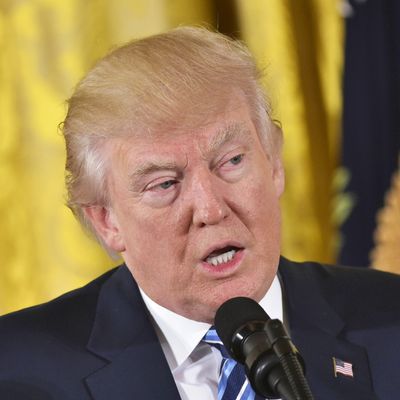
Donald Trump is a con man with a gift for selling comforting fantasies to the desperately insecure — and an insatiable need for affirmation and attention. The Republican Party is a political organization that is committed to redistributing wealth upward, in a time of massive inequality, and legislating sexual morality, in an era of ascendant social liberalism.
When the former first tried to commandeer the latter, he was met with fierce resistance. The GOP leadership knew that Trump had little genuine interest in its policy goals; they knew that the mogul did not run for president to keep a conservative majority on the Supreme Court, but to keep his name in the headlines and his face on television.
But in the end, it didn’t matter that Trump and the Republican Party were driven by different interests, because very few of those interests were in conflict. Sure, some in the GOP were invested in a party-building strategy that forbade naked bigotry, but most were happy to divest from that blueprint the second bigotry won. The ends rationalized the means.
What’s more, in many areas, Trump’s compulsions and the GOP’s desires proved perfectly harmonious. The reality star’s unquenchable thirst for applause — and indifference to the concept of truth — enabled him to crowdsource a winning message for his party’s agenda, one rally at a time.
The president’s Wednesday-morning pledge to launch a “major investigation” into voter fraud is the latest example of the symbiosis between his voracious ego and the Republican Party’s strategic imperatives.
Trump did not call for this investigation in response to evidence of voter fraud submitted to him by state-level Republicans. He called for it because Hillary Clinton’s popular-vote win has made him desperately insecure — and to stifle that insecurity, he has sold a comforting fantasy to himself.
This is not conjecture. The president’s aides have described him as “dogged by insecurity” over the popular vote, in interviews with the Associated Press, Washington Post, New York Times, and other outlets.
Back in November Trump tweeted that he had actually won the popular vote “if you deduct the millions of people who voted illegally.”
At the time, it seemed likely that Trump was intentionally lying to protect his image in the eyes of his supporters. After all, even as Trump argued that the 2016 election was plagued by voter fraud massive enough to doom Republicans in countless down-ballot races, his lawyers were working to quash Jill Stein’s proposed recounts, arguing, “All available evidence suggests that the 2016 election was not tainted by fraud or mistake.”
But this week, Trump repeated his claim in a private meeting with congressional leaders — an audience that he has little hope of conning on this subject. And subsequent reporting from the Post’s Robert Costa indicates that the president has convinced himself that he really did win more votes (from American citizens) than Hillary Clinton did.
If true, then the president of the United States is literally delusional. He is a man capable of believing that millions of people voted illegally when his injured ego demands it — and then of banishing that reality from his mind the moment its implications become inconvenient.
But Trump’s ability to con himself may prove nearly as useful to the GOP as his capacity to con white working-class voters in Youngstown.
The Republican Party does not share the president’s need to mitigate his every narcissistic injury. But it does have a need to protect the more unpopular aspects of its agenda against democratic rebuke. The GOP has won the national popular vote in only one out of the past seven elections. And its standing among the nonvoting population of the U.S. — which is disproportionately poor and nonwhite — is even worse. An uptick in voter participation is one of the gravest threats facing the conservative movement.
In this context, having a shameless, delusional president shouting about rigged elections from his bully pulpit is quite useful.
If Americans believe that voter fraud is a significant threat to their democracy, it will be easier for the Justice Department to, say, demand voter-roll updates and purges in heavily minority areas — or for state-level Republicans to push for new voter-identification laws that disproportionately burden nonwhite voters.
The George W. Bush administration launched a five-year investigation into voter fraud, which turned up “no evidence of any organized effort to skew federal elections.” The GOP has already tried to justify voting restrictions by collecting facts. Now, their best bet is to do so by disseminating delusions. And the man in the White House couldn’t be more qualified for that job.






























